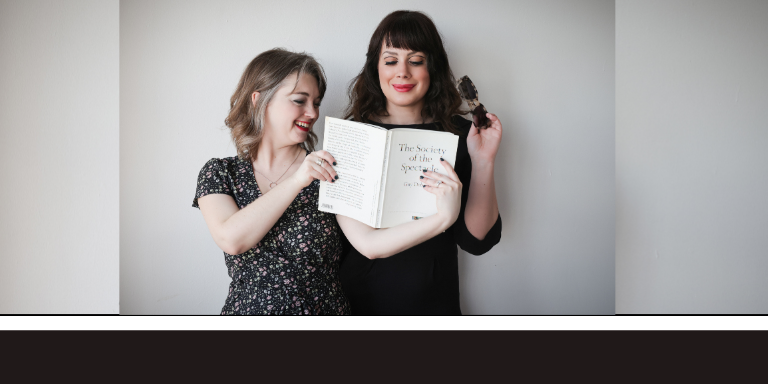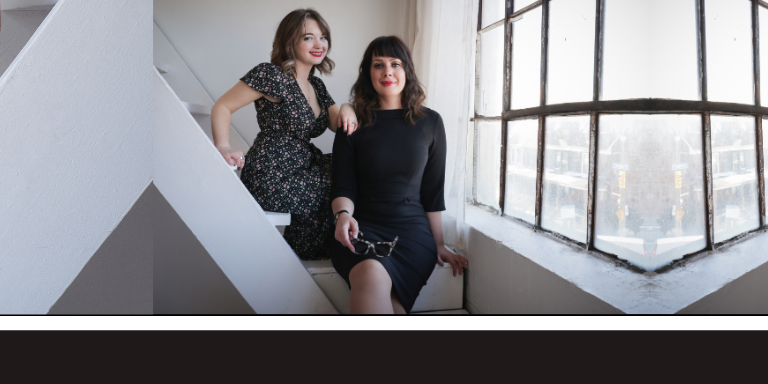Lauralee Sheehan is the Founder and Chief Creative Officer (CCO) of Digital 55, an agency of award-winning designers, developers, researchers, and content producers working together to create innovative digital interactive media products and learning experiences. Digital 55 believes that everything is a learning experience and are committed to producing human-centered, value-based digital media products, encouraging critical thinking on topics and stories that matter.
In terms of Lauralee’s digital career, everything leads back to her band days. She was the frontrunner in the Lovely Killbots for 10 years and started an indie record label. The industry was changing rapidly and it wasn’t just about creating music anymore, it was about building a brand, and building all sorts of digital assets in terms of putting music up on different platforms (MySpace, iTunes, Facebook), making videos, and so on. She grew up as a film baby (her father worked in film), working on various indie sets in her early 20’s. That intersection of audio and visual really started to inform her digital career. At the time she thought, “Oh we just want to be rockstars.” But what they were really doing was experience design.
What is Digital 55 all about?
Digital 55 is a collective of award-winning designers, developers, researchers, and content producers working together to create unique, innovative digital interactive products and learning experiences.
We work with various not-for-profits, government agencies and companies on original content, research, user experience, design, dev, content architecture, learning experience design and strategy, and digital interactive storytelling. What makes us most unique is our rebel spirit, rooted in the interdisciplinary arts, such as music, film, design, learning and experiential builds. We are pretty much obsessed with the intersection of creative and tech. We tackle pertinent, real-time topics such as leadership skills, anti-discrimination, 21st century skills, future of work and so on.
Tell us a little bit about your background and how you started your company?
My digital career really started from being a musician and playing in a band. We started doing all sorts of modular development and experience design and it iterated into a hardcore digital and media career from there.
What was the biggest problem you encountered with your business and how did you overcome it?
I think that formalizing business systems when you have such indie roots is always going to create a bit of internal conflict. You want to keep things agile and exploratory for the team and boundless in terms of company culture but there is a point where you have to get serious about more formalized systems and that can seem like a drag but is actually a critical component of company sustainability. You have to realize that it doesn’t make the company any less edgy to have some more formal systems in place and helps you be more impactful in the work you do.
What were the top mistakes you made starting your business and what did you learn from it?
I used to think that the most important aspect in running Digital 55 was to become known for producing fresh, innovative digital design and interactive media but the true value comes down to the stories we are telling and the content we are working with.
Storytellers are educators and this is important to acknowledge. I’ve learned that storytelling is a critical way to share diverse perspectives and the lived experiences of a spectrum of people. Human experiences are complex and I always knew that telling stories was an important way to honour and connect those experiences, create understanding, provide access to knowledge and through that work, create change.
Additionally, another mistake I made was investing too much time in someone who I thought could be part of the growth team for our next acceleration phase but that, unfortunately, wasn’t the case. Investing in people and not having it work out is costly for any business but especially for a startup. Every position and every moment invested is valuable so for something to not work out is extremely taxing. What I took away from this is that you have to plan exactly what the growth team is going to look like and start going through a more formal hiring process. As appealing as it is to be agile, there is a point where you need to take more time and go through more formalities than you would naturally gravitate towards.

What is one thing that you do daily to grow as an entrepreneur?
Walking and exercise (used to be boxing four times a week pre-pandemic). I call this my analog, no tech time. I think getting physical and spending some time with your thoughts without the distractions of social media, tech and all the other things that might allow you to avoid thinking about things that are uncomfortable, uncertain, or not immediately satisfying is a huge way for me to dedicate some time for growth in my mindset and in turn, helps me show up as a more grounded entrepreneur.
What are three books or courses you recommend for new entrepreneurs?
Catcher in the Rye – As far as clichés go, that book really changed my life. Reading it was a formative experience and for whatever reason, I found myself gravitating to ways of existing in the world that were different from what was expected. Especially as a female, I wanted to live in subcultures, I wanted to live outside of expectations or “good girl” parameters. I wanted to kick down the door of the boys club and demand that I am included. I wanted to care about a cause and provide space for shared conversations about our experiences. That book provided a way for me to forge perspectives on how I wanted to live. The snapshots of moments put together to tell this story made me realize that past traumas don’t have to define your future. I knew that I wanted to live a poetic life personally, and an inspired life professionally and that there’s a way to continue to stay curious, even during the mundane moments, to be present in your life, and to advocate for change. No phoniness 😉
The $100 Startup – I was really inspired by this book because it emphasized building and iterating as you go and to avoid waiting until you have a 50-page business plan or a certain amount of money in the bank. There is never going to be the “perfect moment” to start so in other words, the best time is always now!
Navigating Extraordinary Times – This is a digital learning course we collaborated on with the PowerED team by Athabasca University. It came about to speak to leadership in the early days of the pandemic and addresses how to reflect upon today’s changed work environment, and offers strategies to strengthen leadership and teamwork. Learning objectives include re-evaluating what is possible within present conditions; reconnecting with one’s capacity to practice influence and control in the face of constraints and limitations; supporting the health and wellbeing of oneself and one’s teams; and bringing intention to leadership in a time of crisis but I think there is some really important leadership content included that translates across any societal shock or uncertainty. We talk a lot in the course about empathy, vulnerability and resilience in order to build frameworks leaders can use to support these practices, and regard them as critical in today’s workplaces.
What is the one thing you wish you knew before starting your business?
It’s a bananas lifestyle. I think a lot of people can run a business and have success in the entrepreneur space but I do also think that it’s important to acknowledge that it is not very glamorous at all, despite what social media might have you believe. You sacrifice other parts of your life to give to your business, your team, your clients and collaborators, and the work you are putting out into the world. There are things that you will have and things that you won’t have in life because you are an entrepreneur.
What has been your most effective marketing strategy to grow your business?
We are doing a lot of continuous deployment on social and trying out growth hacking in terms of our marketing and operations strategy.
This means we are focusing on content first and letting our audiences grow organically from there. It’s been really interesting for us as we’ve recently launched an original series vertical in addition to our client collaborations so our marketing and operations strategy has to iterate because of that. The originals are cool and exciting because we get to explore different modalities and audience building strategies on different media platforms and channels. I think it’s important to test strategies out in an MVP (minimum viable product) type format and know that you have to iterate constantly to fit your evolving needs. This helps us maximize our time and our knowledge to build iteratively and focus on sustainability.
What’s your best piece of advice for aspiring and new entrepreneurs?
My recommendation is to focus on the things that inspire you and it will translate to your success as a business owner. For instance, I am a huge film and music buff, and sometimes watching the latest film by, say, David Fincher, is going to get me away from the mechanics of entrepreneurship and tune into that high-level thinking that is the super powerful, valuable part. You have to care about what you are doing and not just from a business perspective but from a human experience and social sustainability perspective. Invest in the things that inspire you with no inhibitions and that will come back to you tenfold.
What is your favorite quote?
“Life is what happens while you’re busy making other plans.”
This famous saying from John Lennon reflects a paradox in our lives. Although we like to live in the moment, we also continuously plan for the future. The beauty in this quote is not that we don’t have agency over what happens in our lives but there is something poetic in being open to things you haven’t planned for and know that might be exactly where you need to be.
We use InVision in our early collaboration and concepting work and I love all the great thinking and perspectives included in their blogs. The blog isn’t really about the tool, it’s about how we can all be better designers in the world. But you also get some cool hacks or new techniques to try, to make your design process more sustainable and meaningful.
We also use Asana for project management, capacity tracking, and growth strategy. It is helpful for us to collaborate, plan, edit, iterate on not only our project portfolio but also our growth strategies.
One thing we can’t live without is the entire Adobe Creative Cloud Suite including Photoshop, Illustrator, InDesign, After Effects, XD. We use various applications across our production lifecycle and for interactive digital media, these tools are critical in the work we do.
How can readers get in touch with you?
Readers can get in touch with us through our Instagram page: @digital_55, Facebook page: Digital 55 Studios, or LinkedIn page: Digital 55 Studios
Entrepreneur Interview: Julie Aragon’s Journey from Mortgage to Mobile Apps








